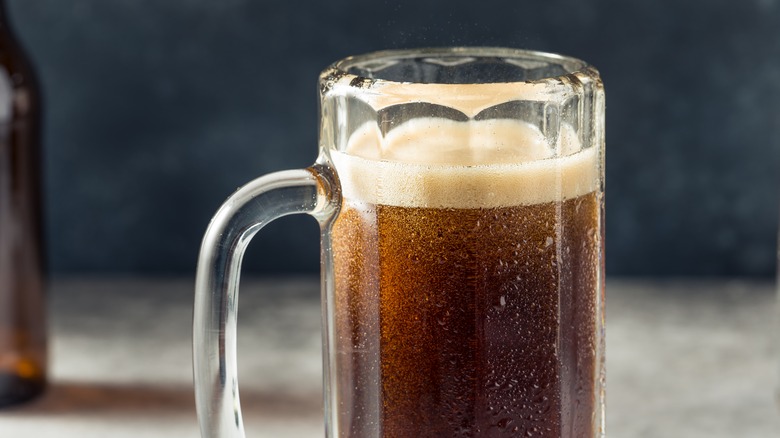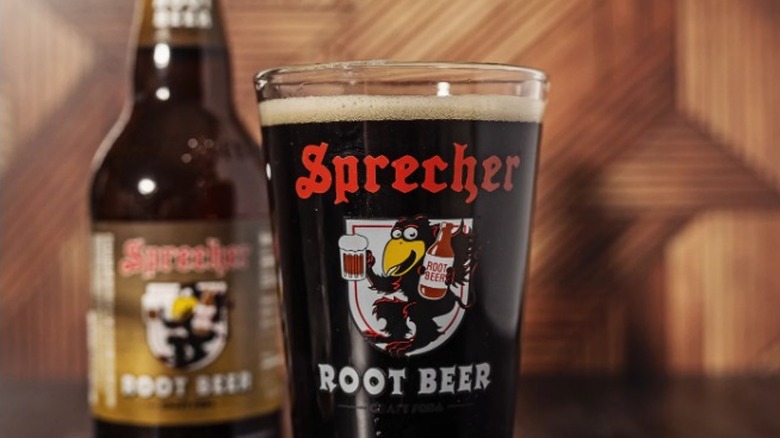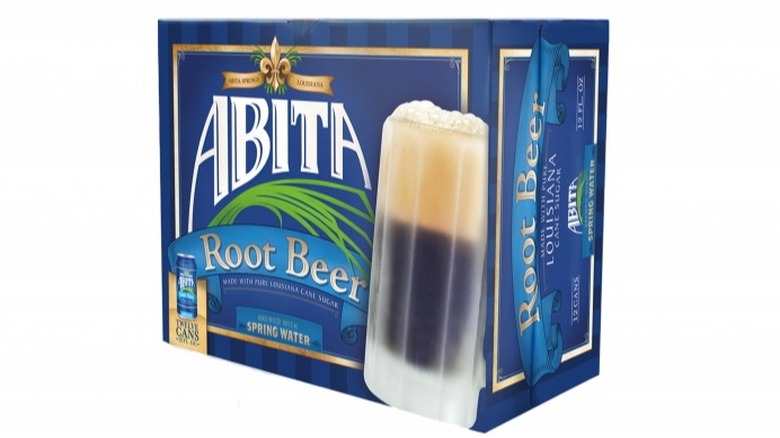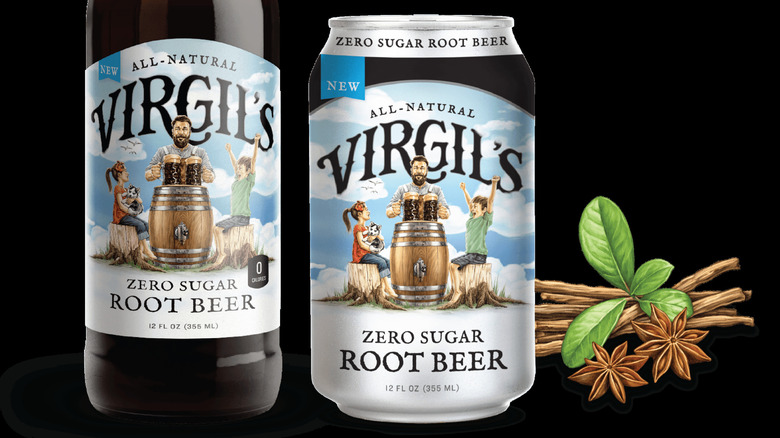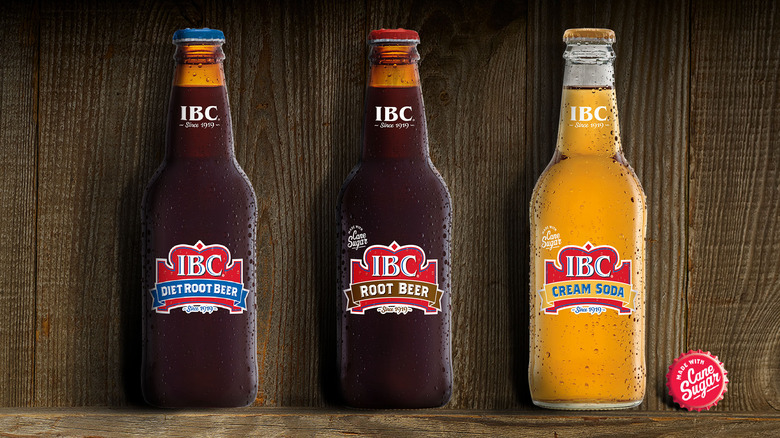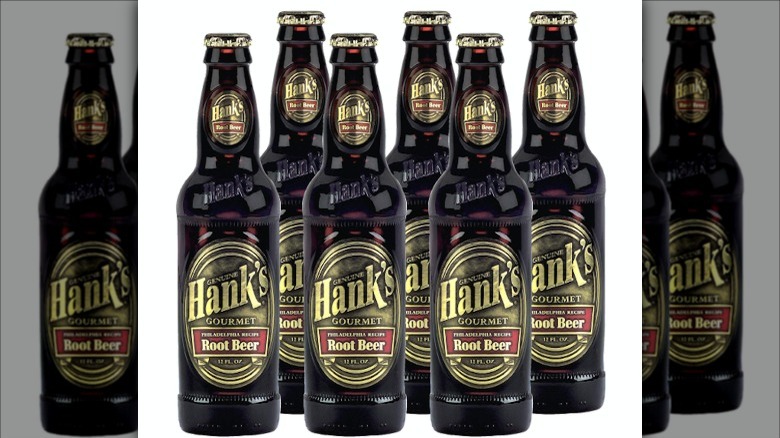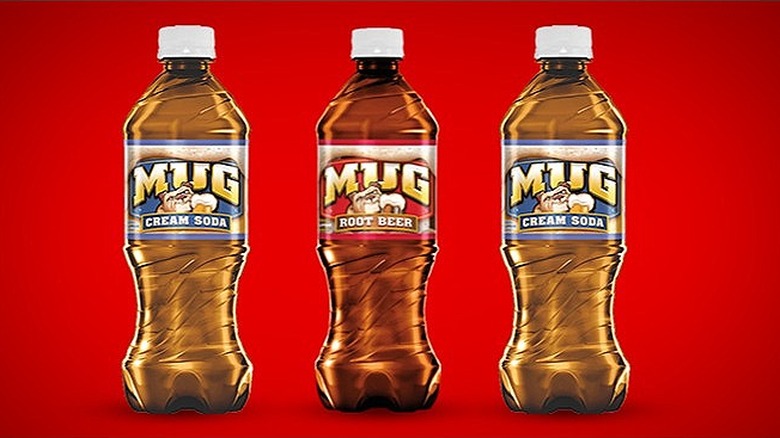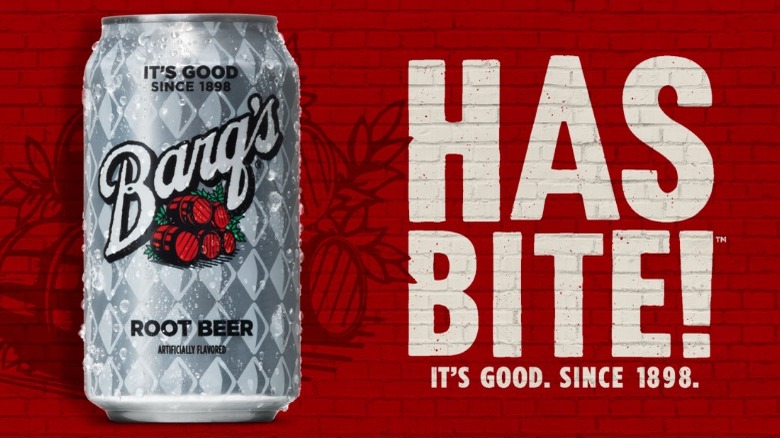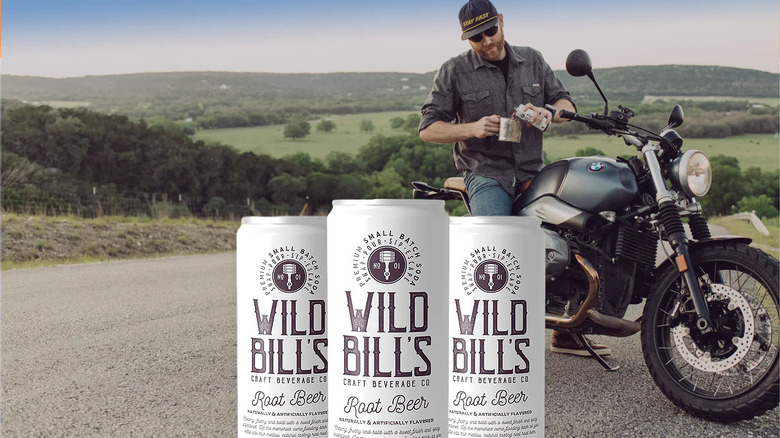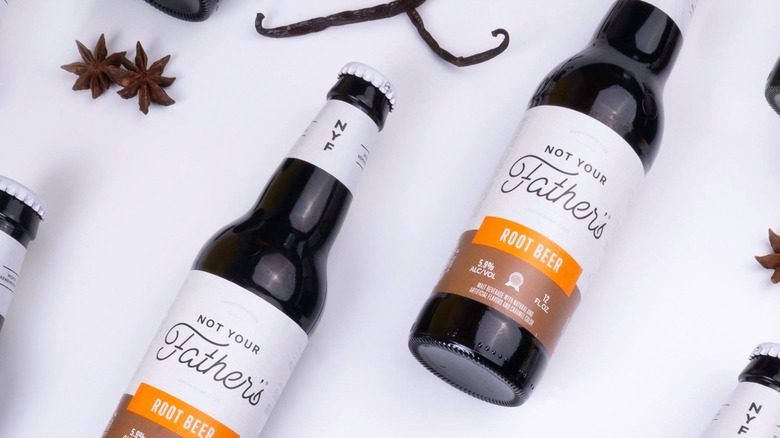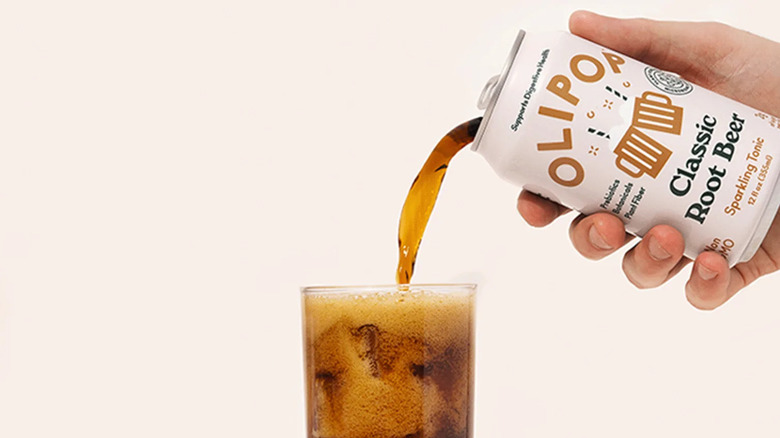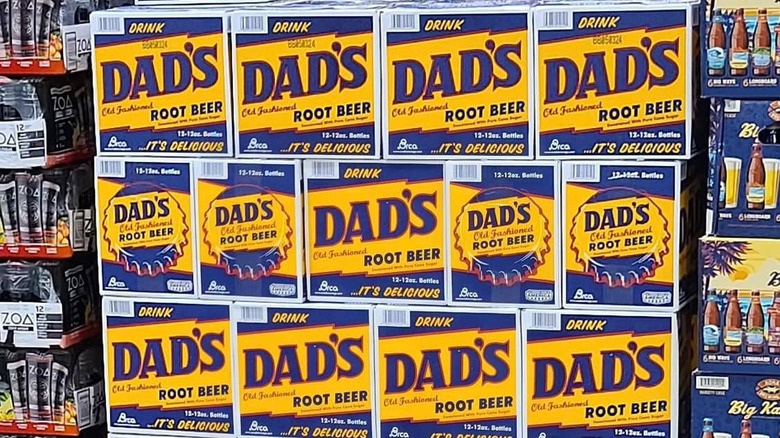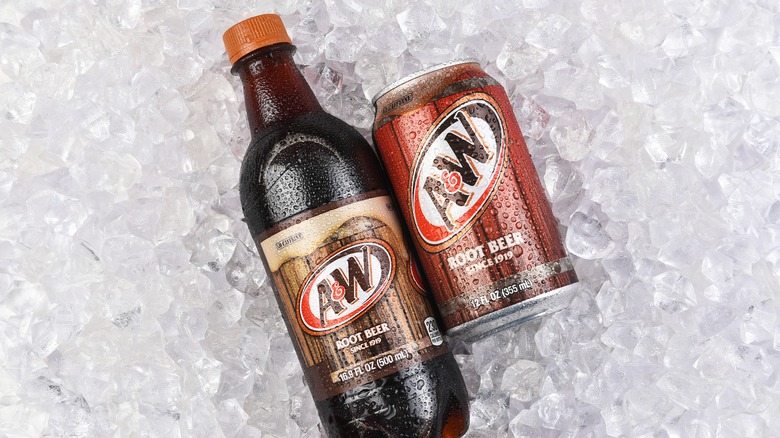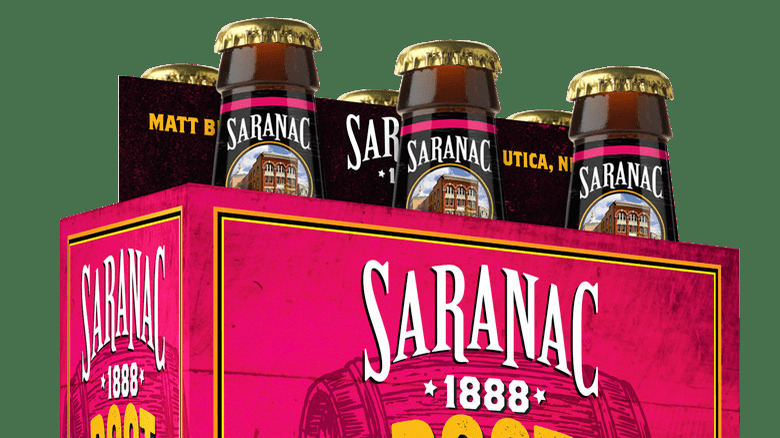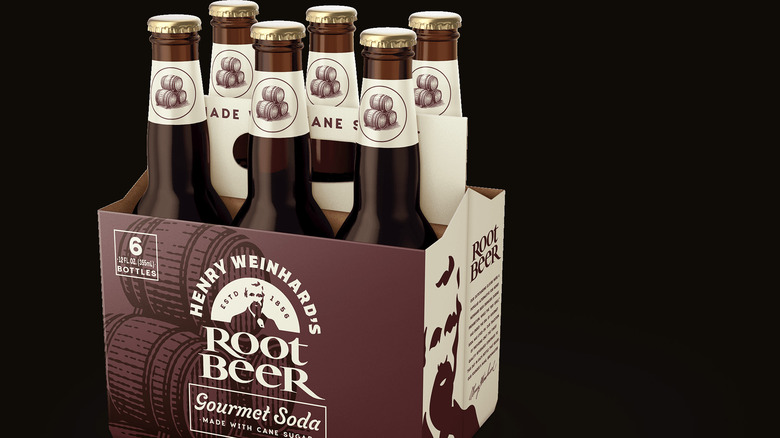14 Best Root Beers, Ranked
Even though it presents as a pretty basic beverage, there are many fun facts when it comes to root beer. According to ThoughtCo, the tradition of making beverages from root plants was a common practice among Indigenous Americans well before the colonists arrived. Many of the household-name brands date back a century or more and have a storied history. There are craft root beers from around the United States that have proud roots — pun intended — in the specific region where they were developed. Beyond the familiar names, there are also upstarts that promise health benefits that extend from excluding sugar entirely to providing stomach health in the form of prebiotics.
In general, there's no need to pull out the identification card. Despite the name, root beer traditionally does not contain alcohol. While there are some hard root beers out there that have an alcohol component, by and large you can feel fine serving it up to the underage crowd. In fact, more than a few root beer brands that survive to this day were devised as a way for breweries to survive during the hard times of the Prohibition Era.
Going the root beer route is certainly one way to commit to a New Year's resolution of sobriety, or simply muster through a month-long dry January effort after the holidays. If you're not compelled to get a basic soda pop or order up a Shirley Temple or Roy Rogers, get yourself some root beer. We are happy to provide some do's and don'ts when you're shopping.
14. Sprecher
This craft root beer based in Wisconsin is one of the newer brands on the market, having started in 1985. Sprecher advertises itself as being fire-brewed, which is a nod to the specific technique used in their process that involves a gas-fired brew kettle. It's also sweetened with local honey (via Sprecher), but we found the resulting flavor of Sprecher to be a bit too cloying, containing more sugar than spice.
There's a somewhat peppery aroma as you dip your nose into the glass. Not a bad start, but once you've had a few sips there's a mostly underwhelming finish. While it does have a touch of creaminess that provides a soft mouthfeel, you're left with a strong rush of sugar up top that dissipates rather quickly.
All this being said, Sprecher does have its fans. For those who don't have fast and easy access to the brewery itself, they can order from the company's website and have it shipped either for their own enjoyment or as a gift to a fellow root beer devotee.
13. Abita
New Orleans-based Abita serves up more than just lagers, stouts, and ales. Abita prides itself on a root beer recipe that features pure Louisiana sugar cane. For anyone who's a big fan of Mexican Coca-Cola — also sweetened with sugar cane rather corn syrup — this might be the root beer for you. And if you're a fan of LSU, much of Abita's merchandise is appropriately purple-hued, so consider sporting a hat or a tee when you bring a six-pack to your next tailgate party.
The nose on Abita's root beer hits you immediately and evokes winter holiday aromas. Abita root beer incorporates spring water and an interesting contribution in the form of the yucca shrub in an effort to create foam (via Abita) — though we actually found there to be little on that front. It fell short in terms of viscosity, coming across somewhat thin. Vanilla beans and a requisite assembly of herbs have been added for a boost of flavor. But the finishing taste unfortunately evokes some aspartame and peppermint schnapps, which ultimately made this not our favorite root beer option.
12. Virgil's Zero Sugar Root Beer
"Virgil's is a perfectly balanced blend of 15 roots and spices. Dare we say, it has character and a personality unlike any other in the world. Rich, creamy, complex yet smooth."
Despite its lack of sweet, sweet sucrose, Virgil's has delivered a can of sugar-free root beer that's worth cracking open if you're craving root beer but adhering to a specific diet. It contains zero sugar, zero calories, zero fat, zero sodium, and just a scant amount of carbohydrates at 7 grams per 12-ounce can (via Virgil's). As a result, it's also keto friendly.
With a blend of over a dozen various spices and a healthy dose of stevia, significant efforts were made that you won't notice a major difference between this diet-oriented root beer and the standard options. But, reviews from consumers are rather mixed. While some may be willing to sacrifice the full-force flavor of a sugared root beer, a comment from an individual who purchased the product from Amazon remarked that it tasted more like "water with light root beer after taste" and compared it to flavored seltzer.
11. IBC
The IBC acronym is connected to the Independent Breweries Company, which got its start in St. Louis, Missouri, back in 1919. A common theme among many familiar root beer brands, the love for this particular sudsy sip sprung from it being a legal option during the Prohibition Era. Even after the national ban on alcohol was lifted, the love for IBC remained. At the time of publication, the brand is under the purview of Keurig Dr Pepper Inc.
Among the brands we tested, IBC was not in the top tier. We found the scent to be somewhat uninviting right off the bat — we would note it to be rather astringent, perhaps even fooling you into thinking there's alcohol in the mug. Moving past that, the flavor was unremarkable and did not carry any notes that would set it apart from other root beers on the market. On a positive note, the brand offers a diet option for those who are so inclined, and the regular non-diet version is made with cane sugar rather than corn syrup, which many would see as a plus.
10. Hank's
Philadelphia-based Hank's Gourmet root beer is worth seeking out and trying due to the brand's dedication to going the high route (via Hank's). That would include using cane sugar, always a bragging right to oppose the mass market brands out there that are laden with high-fructose corn syrup. Along with cane sugar, other upscale ingredients factor into a higher price tag. But, we would argue that if you're a true root beer aficionado, you might not be too satisfied with your purchase of Hank's.
Hank's is a decently well-balanced recipe that hits all the flavor notes, but perhaps not in the best sense. It comes across as a slightly elevated version of a garden-variety mainstream product. It doesn't quite earn the extra expense when you can just go with buying a few liters of a store brand for your kid's birthday party. There aren't enough distinguishing characteristics and not much to challenge the palate, although we did detect a nice bit of marshmallow in the finish.
9. Mug
One of the more recognizable root beers on the market appropriately has the shorthand name of Mug, a chilled mug being the iconic glassware vessel of choice for the beverage. Featuring a charming logo with a happy bulldog mascot, Mug root beer's place of origin is San Francisco, so consider enjoying it with a slice of sourdough bread or a hearty bowl of cioppino. Mug originally went by the much lengthier moniker of Belfast Old Fashioned Mug Root Beer, and was first introduced to thirsty Northern California root beer fans back in 1940. While Belfast also produced seltzer and ginger ale, it was their root beer that took off to widespread popularity and inevitably sold to PepsiCo in 1986 (via SF Gate).
It's a mainstream and straightforward root beer offering with no discernibly distinct flavor qualities, and Mug root beer is available nationwide in cans, various sizes of bottles, and also at soda fountains. It also comes in a diet formula, which not many root beer brands — especially the artisan craft root beers — can offer.
8. Barq's
Barq's root beer has its particular roots in the Deep South. The esteemed creator of the silver-canned root beer's full name was Edward Charles Edmond Barq Sr.
Born in New Orleans to French immigrants, Barq moved to Biloxi, Mississippi, as a young adult in 1897. Not long after that, he first began serving his particular spin on root beer. When Prohibition went into effect in the 1920s, he saw profits soar from his non-alcoholic offering. When the booze ban was finally lifted and after its founder's death, Barq's just kept going, expanding its distribution across the country and eventually selling to Coca Cola in 1995 (via Barq's).
As the familiar slogan goes, Barq's does have bite. Part of the bite may come from the fact that Barq's is different from its counterparts due to its caffeine content (via Barq's). Not many root beers out there can claim that, so you can enjoy the jolt you'll get from the can, but be advised that the recipe also includes high-fructose corn syrup if that's a particular concern for you.
7. Wild Bill's
"Proudly served by those who've served" is what Wild Bill's is all about. A company owned and operated by veterans and largely staffed by veterans as well, Wild Bill's root beer offering is also eager to assure you that it's vegan friendly. While this is true of many root beers (via Your Vegan Journey), it's a badge of pride for the Wild Bill's brand in addition to being gluten-free and using cane sugar as opposed to corn syrup.
Amazon reviewers tend to agree that this isn't the most potent root beer on the market, with one individual noting that "the flavor is a bit more subtle than the standard root beers," but at the same time also appreciating that it's not overly sweet.
Beyond its root beer that has a juniper flavor, Wild Bill's offers a wide range of adjacent soft drinks, including a licorice-laced sarsaparilla, a birch beer touched with wintergreen notes, a gently spiced ginger ale, and plenty more. If you're unsure what to try, you can order a variety pack and see what suits your palate best (via Wild Bill's).
6. Not Your Father's
Maury Povich might need to come out of retirement and give his expert take on Not Your Father's hard root beer. The brand label of Not Your Father's is somewhat self-explanatory, but to be clear, you won't find it in the soft drink section of your local beverage purveyor. So, let's put the warning in neon: This is not for the teetotalers out there. If you want to try it, you'll have to venture into the boozy section and be prepared to show ID to the cashier. The Illinois-based root beer contains an ABV (that's alcohol by volume) content of 5.9% which, by the individual bottle, puts it in league with the potency of a strong ale (via Total Wine).
If you like the buzz you get from a hard drink and enjoy the taste of root beer, Not Your Father's Root Beer is a win-win. It tastes not dissimilar to the many non-alcoholic root beers available. The presence of alcohol is discernible, especially if you're aware it's in there, but for the most part it's subtle. But, unlike regular beer where you might be tempted to have two or three bottles, the amount of sugar in Not Your Father's becomes a bit much after a while. We would recommend it as a gift for the craft beer fan in your life.
5. OLIPOP
Carbonated beverages notoriously have a tendency to make your tummy rumble, but OLIPOP's root beer is determined to switch up the narrative. As a brand in general, OLIPOP is a fresh newcomer compared to competitors that have existed for decades. A major way it sets itself apart is that the company has brought in a team of PhD-wielding experts in the field of gut health. As a result, OLIPOP is steering clear of excessive sugar, artificial caramel coloring, sodium benzoate, and citric acid, all in an effort to provide a better option for those prone to seeking out a daily dose of soda pop (via OLIPOP).
Prebiotics and fiber are important components of OLIPOP. From an interview conducted by Forbes with co-founder David Lester, "The problem is soda generally has too much sugar in it and it doesn't contribute anything towards your health nutritionally. If you solve for those two issues without taking anything away from the joy and nostalgia of drinking soda, then you can pull people back into the category and get them to consume a product that's actually high in fiber."
We applaud the noble mission of OLIPOP to improve gut health. But, be aware that for now there is a bit of a higher price tag in order to enjoy the fruits of its efforts. At the time of publication, it was going for a whopping $3.00 per can on Target's website.
4. Dad's
Like many of the notable root beer brands out there, there is some fun history here, and in the case of Dad's root beer it goes back to the 1930s. Barney Berns and Ely Klapman brewed up the first batches in their basement in the Chicago area and took care to perfect their recipe, eventually getting it trademarked in 1938. The name "Dad's" is a nod to Klapman's father who home-brewed root beer, which was a common practice among his generation (via Dad's).
Dad's doesn't hold back on the spice for those who are fans of that element in their root beer. It packs a powerful punch of cinnamon and clove notes along with some hints of berries, but it also does have a drier mouthfeel and is less creamy than some of the other root beers on the market. It's not a particularly smooth sipper, but when the sweetness hits, you could compare it to a variant of Dr. Pepper. This is where a scoop of vanilla ice cream would be particularly handy so this drink can truly float.
3. A&W
Arguably the grand poobah when it comes to root beer, A&W's brand extends beyond its famous soft drink. It includes a fast food chain that's actually one of the oldest franchises in the country, going back to 1919, when it started as a humble root beer stand in Lodi, California. It was an effort by founder Roy W. Allen to quench the thirst of weary veterans returning after victory in World War I. The popularity of the beverage led to expansion to a restaurant that had its heyday in the 1970s, when it had more locations than McDonald's (via A&W).
While A&W has its restaurants and its root beer can be enjoyed on its own, its other major claim to fame is its root beer floats. We would recommend attempting the float recipes they provide on their website. One is a Campfire Root Beer Float that's topped with mini chocolate chips, toasted marshmallow, and sprinkles of graham cracker crumbs. Perfect to drink, and also post on your socials.
2. Saranac
Saranac comes courtesy of 19th-century German immigrants. So named after the Saranac railroad line in upstate New York, the Utica, New York-based brewery can trace its origins all the way back to 1888. It was founded by Francis Xavier Matt, who came to the United States from Deutschland at the tender age of 19 years old (via Saranac).
Perhaps we picked up a bottle that was recently filled, because we found Saranac to be particularly well carbonated. As far as the taste goes, it's pleasantly well balanced with creamy qualities alongside sparkly jolts of cinnamon. And surprisingly, we also picked up some notes of banana, though that's not one of the company's advertised flavor components — they list vanilla and licorice instead (via Saranac). We would rank Saranac's root beer in the upper tiers of our list due to its zesty tang that helped to round out the flavors, proving it to be a bit less cloying compared to its competitors.
1. Henry Weinhard's
This particular root beer has a history dating all the way back to the 1850s, when Henry Weinhard made the long journey to Portland, Oregon, all the way from Germany, across the Atlantic and over the North American continent. Weinhard was such a fan of beer in general that he pursued work at a brewery and then set out to make his own ale concoctions. Even after Weinhard's death in the early aughts, his brand soldiered on. But the Prohibition Act in 1920 was a major shake-up in the beverage industry and required a shift in the company's output, thus leading to a focus on fizzy sodas such as root beer to keep the business going as the United States went dry (via Henry Weinhard's).
This was our favorite sampling for various reasons. It has a nice mouthfeel, it has the punchy bite you're looking for in a root beer, it's got that sweet brown sugar sensation, and it contains all the herbal notes you want as well. Even if you're not a huge fan of licorice, you're going to get a hit of that and not mind it. The finish at the end of your sip even has a little bit of cherry on top.
